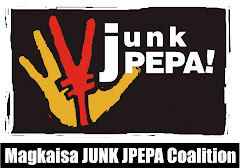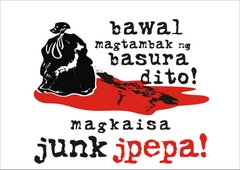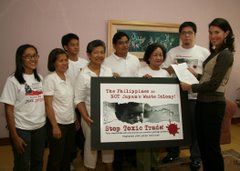
"Babagan ang JPEPA!" -- Farmers, urban poor groups, environmentalists and other members of various Cebu-based civil society groups decry the Japan-Philippines Economic Partnership Agreement (JPEPA) for allowing Japanese citizens to own private land in the
“Babagan ang JPEPA!”
Farmers Decry Treaty for Allowing Japanese to Own Land
October 17, 2007.
At the center of the regional discussion was JPEPA’s assault on the Philippine Constitution by allowing Japanese entities to own land in contravention of the limits set by the Constitution. Under Art. XII, Section 7 of the Constitution, ownership of private lands are allowed only to Filipino citizens and to corporations whose capital is owned by at least 60% of such citizens. However, it was revealed at the forum that the Government negotiating panel for the JPEPA made a crucial error in including the Constitutional limitation on land ownership in Annex 7 of the JPEPA only in the manufacturing sector when the Constitution imposes the limit for all sectors.
The Philippine government’s omission in Annex 7 in effect ties its hands to later raise the land ownership limits on Japanese investors. Under Article 89 of the JPEPA, the
“Under the JPEPA, the Japanese are being treated better than the Filipinos in their own land!” exclaimed, Pascual Tabuac from Philnet-RDI. “Filipino farmers have been waiting for over 20 years to own land, yet with the ratification of this controversial treaty, in a matter of two years the Japanese will be able to own the same land we have been tilling all our lives.
Filipino farmers are concerned over the pending end of the budget, in 2008, for the Comprehensive Agrarian Reform Program (CARP), which will give them a slim chance to own land. By opening the land to Japanese investors, the struggle for true agrarian reform will be ignored. Adding to the concern of farmers is the fact that private lands are now slowly being leased to private investors (i.e. RP-China Agri-Business deals).[iii]
“The JPEPA will hammer our farmers starting from tariffs on their agricultural exports all the way to land ownership,” stated Atty. Golda Benjamin, lead counsel of the Magkaisa Junk JPEPA Coalition, one of the resource speakers at the forum. “The Philippine government has neglected its farmers for too long. It needs to change this course, and it can begin by not ratifying JPEPA.”
[i] The Regional Forum was organized by: Freedom from Debt Coalition (FDC), Green Forum, University of the
[ii] Those present at the forum were: Freedom from Debt Coalition, Philnet-RDI, YouFra, FMJPIC, SFDRREAM, Piglas Kabataan, NUWHRAIN, Sanlakas Youth, PM, ASUCAR, LANFABA, KPML, APL, FDC, FIND, Sanlakas-Cebu, TFFI, SEIV, SIFPO, KPD, DPSOI, GKK-Coop, GKK-HOA.
[iii] Right now, many private land owners lease out their lands that are vulnerable to CARP coverage and use the existing lease contract as an excuse not to be covered by the program (although the law does not exclude such lands from coverage)






No comments:
Post a Comment